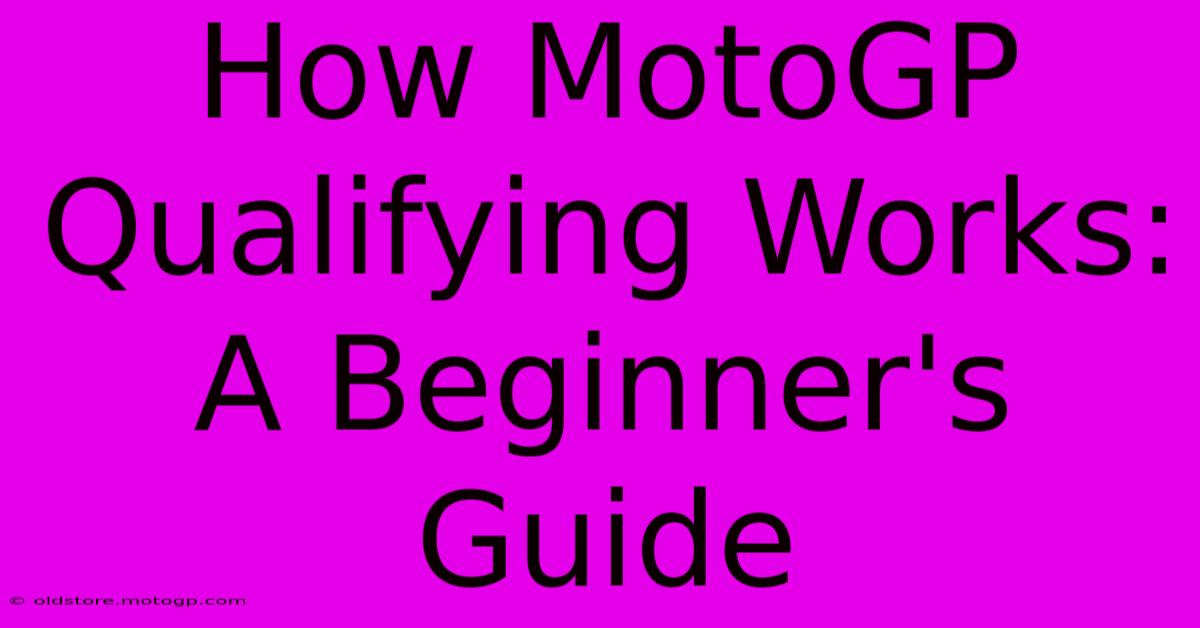How MotoGP Qualifying Works: A Beginner's Guide

Table of Contents
How MotoGP Qualifying Works: A Beginner's Guide
MotoGP racing is exhilarating, but understanding the nuances of qualifying can be tricky for newcomers. This beginner's guide breaks down the process, explaining how riders fight for pole position and the crucial role qualifying plays in the race.
The Importance of Qualifying in MotoGP
Qualifying in MotoGP isn't just about securing a good starting spot; it's a critical determinant of race results. A strong qualifying performance can:
- Give a significant advantage at the start: Being on the front row allows riders to avoid the first-lap chaos, crucial in a sport where incidents are common.
- Improve race strategy: A better starting position enables riders to dictate the pace and control the race.
- Boost rider confidence: A strong qualifying performance builds momentum and confidence going into the race.
The Qualifying Format: A Step-by-Step Breakdown
The MotoGP qualifying process consists of three sessions:
1. Free Practice (FP1, FP2, FP3):
These sessions are crucial for data gathering. Teams work on bike setup, tire strategies, and overall race pace. The combined times from all three Free Practice sessions determine which riders progress directly to Q2. The top 10 riders from the combined FP times automatically advance.
2. Qualifying 1 (Q1):
Riders who didn't make the top 10 in the combined FP sessions compete in Q1. This is a 15-minute shootout, with only the top two riders progressing to Q2. This session is often intense and full of last-minute heroics. The pressure is immense as these riders fight for a crucial spot in the next round.
3. Qualifying 2 (Q2):
This is where the real battle for pole position takes place. The top 10 riders from the combined Free Practice sessions, plus the two fastest from Q1, compete here. This 15-minute session determines the starting grid positions for the race. The fastest rider secures pole position, followed by the rest of the grid based on lap times.
Understanding Qualifying Laps: The Key to Success
A successful qualifying lap requires precision, skill, and perfect execution. Riders need to:
- Find the perfect line: Knowing the optimal racing line is crucial for minimizing lap time. Every inch counts.
- Optimize tire pressure and temperature: The tires need to be at the perfect temperature and pressure for optimal grip. This is carefully managed by the team.
- Master the slipstream: Drafting behind another rider (slipstreaming) can significantly reduce air resistance, improving speed on the straights. However, it also requires precise timing and positioning.
- Execute flawless cornering: Smooth and precise cornering is essential for maintaining speed through the turns. One small mistake can cost precious milliseconds.
Beyond the Times: Strategy and Teamwork
While individual rider skill is paramount, teamwork plays a huge role in qualifying. The pit crew's efficiency in tire changes and adjustments directly influences the rider's performance. Data analysis and strategical decisions made by the team regarding tire choice and fuel loads also play a significant role. It's a collaborative effort aiming for the perfect lap.
Key Takeaways: What Makes a Successful MotoGP Qualifying?
- Mastering the track: Knowing every nuance of the circuit is essential.
- Perfect execution: A single mistake can ruin a qualifying lap.
- Teamwork: The rider and the pit crew must function as a single, highly-tuned unit.
- Strategic thinking: Choosing the right tire compounds and understanding the weather conditions are crucial.
By understanding the intricacies of MotoGP qualifying, you'll appreciate the level of skill, strategy, and teamwork required to secure a front-row starting position and enhance your viewing experience of the race itself. The next time you watch a MotoGP race, you'll have a much deeper understanding of the crucial battle that takes place before the race even begins.

Thank you for visiting our website wich cover about How MotoGP Qualifying Works: A Beginner's Guide. We hope the information provided has been useful to you. Feel free to contact us if you have any questions or need further assistance. See you next time and dont miss to bookmark.
Featured Posts
-
Cota Qualifying The F1 Grid Takes Shape
Feb 24, 2025
-
Cota Qualifying Avoid These Common Mistakes
Feb 24, 2025
-
Yamaha V4 The Ultimate Symbol Of Power
Feb 24, 2025
-
Motorcycle Racing And Film Capturing The Drama And Excitement
Feb 24, 2025
-
Stress Free F1 Viewing Austin Tv Schedule Here
Feb 24, 2025
